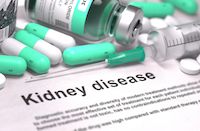Article
Study Links Incident Heart Disease to Increased Risk of Kidney Failure
Author(s):
An analysis of more than 9000 patients found incident heart disease was associated with an increased risk of developing kidney failure later in life.

A new study, led by investigators from the Johns Hopkins Bloomberg School of Public Health, has discovered an alarming, potential link between cardiovascular disease and a person’s risk of developing kidney failure.
The community-based study, which included more than 9000 US adults and a median follow-up of 17.5 years, found patients with cardiovascular disease had a higher risk of kidney failure, with heart failure patients at an 11.4-fold increased risk of developing kidney failure.
“Many physicians probably recognize that patients with cardiovascular disease are at risk of kidney disease progression, but to my knowledge, this is the first study quantifying the contribution of different cardiovascular diseases to the development of kidney failure," said Kunihiro Matsushita, MD, PhD, associate professor at Johns Hopkins.
With a long history of data and research, cardiorenal syndrome is well-documented but investigators sought to expound on the long-term impact on the risk of end-stage kidney disease associated with the development of cardiovascular disease. To do so, investigators conducted a prospective cohort analysis of 9047 patients from the Atherosclerotic Risk in Communities (ARIC) study. For inclusion, patients needed to be free of major cardiovascular disease at visit 4 of the ARIC study, which occurred between 1996 and 1998.
For the purpose of the analysis, investigators evaluate the association of incident hospitalization with heart failure, atrial fibrillation, coronary heart disease, and stroke and the subsequent development of end-stage kidney disease. Every incident cardiovascular events were included in a multivariable Cox proportional hazard model as a time-varying exposure to estimate hazard ratios.
Over the follow-up period, which ended in 2015, 2598 hospitalizations for major cardiovascular events occurred. Of the conditions included, atrial fibrillation (1337) was the most common followed by heart failure (1269), coronary heart disease (696), and stroke (559).
A total of 210 cases of incident end-stage kidney disease were recorded during follow-up. Incident end-stage kidney disease was recorded in 134 of the 2598 patients who suffered a major cardiovascular disease event and 76 were recorded among the 6449 patients without cardiovascular disease.
Results of the investigators’ analyses revealed all cardiovascular disease events included were associated with an increased risk of developing end-stage kidney disease. Specifically, heart failure was associated with an 11.4-fold increased risk(HR: 11.4; 95% CI, 8.4-15.5), coronary heart disease increased risk 3.7-fold (HR: 3.7; 95% CI, 2.5-5.3), atrial fibrillation resulted in a 2.7-fold increase (HR: 2.7; 95% CI, 1.9-3.8), and stroke correlated with a 1.4-fold increase in end-stage kidney disease (HR: 1.4; 95% CI, 0.9-2.4).
Investigators noted separate analyses assessed the risk associated with heart failure with preserved ejection fraction (HFpEF) and heart failure with reduced ejection fraction (HFrEF). These analyses indicated HFpEF was associated with a significantly greater risk of developing end-stage kidney disease than HFrEF.
“Physicians should be aware of cardiovascular disease as an important risk condition, and thereby minimize treatments that are toxic to the kidneys in such individuals," said Junichi Ishigami, MD, PhD, assistant scientist at Johns Hopkins. "Additionally, our findings may have implications for monitoring kidney function, although current cardiovascular disease guidelines do not necessarily specify the frequency of evaluating kidney function following the incidence of cardiovascular disease."
This study, titled “Incident Hospitalization with Major Cardiovascular Diseases and Subsequent Risk of ESKD: Implications for Cardiorenal Syndrome,” was published in the Journal of the American Society of Nephrology.





